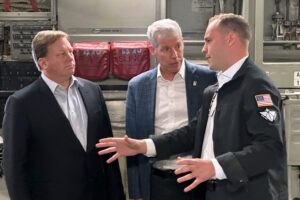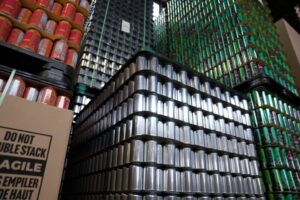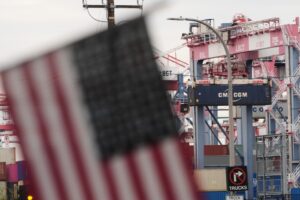Politics
Justice Department says Ryan Wesley Routh left note indicating he intended to kill Trump
WEST PALM BEACH, Fla. (AP) — The man accused in the assassination attempt of Donald Trump at a golf course in Florida left behind a note detailing his plans to kill the former president and kept in his car a handwritten list of dates and venues where Trump was to appear, the Justice Department said
WEST PALM BEACH, Fla. (AP) — The man accused in the assassination attempt of Donald Trump at a golf course in Florida left behind a note detailing his plans to kill the former president and kept in his car a handwritten list of dates and venues where Trump was to appear, the Justice Department said Monday.
Trump complained that the current holding charges against the man were too light, but prosecutors indicated much more serious attempted assassination charges were coming.
The new allegations about the note were included in a detention memo filed ahead of a hearing Monday at which federal prosecutors argued that Ryan Wesley Routh should remain locked up as a flight risk and a threat to public safety. U.S. Magistrate Ryon McCabe agreed, saying the “weight of the evidence against the defendant is strong” and ordered him to stay behind bars.
The latest details were meant to bolster the Justice Department’s contention that the 58-year-old suspect had engaged in a premeditated plan to kill Trump, a plot officials say was thwarted by a Secret Service agent who spotted a rifle poking out of shrubbery on the West Palm Beach golf course where Trump was playing and then opened fire in Routh’s direction.
The note describing Routh’s plans was placed in a box that he dropped off months earlier at the home of an unidentified person who did not open it until after last Sunday’s arrest, prosecutors said.
The box also contained ammunition, a metal pipe, building materials, tools, phones and various letters. The person who received the box and contacted law enforcement was not identified in the Justice Department’s detention memo and was described only as a “civilian witness.”
One note Routh left, addressed “Dear World,” appears to have been premised on the idea that the assassination attempt would be unsuccessful.
“This was an assassination attempt on Donald Trump but I failed you. I tried my best and gave it all the gumption I could muster. It is up to you now to finish the job; and I will offer $150,000 to whomever can complete the job,” the note said, according to prosecutors.
The letter offers “substantial evidence of his intent,” Assistant U.S. Attorney Mark Dispoto said in court Monday.
“That’s the message he wanted to send to the world in advance of this incident” he said.
In a statement, Trump accused the Justice Department of “mishandling and downplaying” the apparent assassination attempt by bringing charges that were a “slap on the wrist.”
Routh is currently charged with illegally possessing his gun in spite of multiple felony convictions, including two charges of possessing stolen goods in 2002 in North Carolina, and with possessing a firearm with an obliterated serial number. But Dispoto said in court Monday that prosecutors would pursue additional charges before a grand jury accusing him of having tried to “assassinate a major political candidate” — charges that would warrant life in prison in the event of a conviction.
It is common for prosecutors to file more easily provable charges as an immediate placeholder before adding more significant allegations as the case proceeds.
Trump also claimed that the Justice Department has a conflict of interest in prosecuting this case since, under the supervision of a special counsel, it is simultaneously pursuing cases charging him with plotting to overturn the 2020 election and with hoarding classified documents at his Mar-a-Lago estate. He signaled support for a separate state-level criminal investigation announced last week by Florida Gov. Ron DeSantis.
Kristy Militello, an assistant federal public defender representing Routh, asked during Monday’s hearing for Routh to be permitted to live with his sister in Greensboro, N.C., as the case moves forward. She argued that prosecutors had failed to show that he was a threat to the community and noted his track record of habitually showing up for court appearances throughout decades of legal troubles.
Besides the note, prosecutors also cited cellphone records indicating that Routh traveled to West Palm Beach from Greensboro in mid-August, and that he was near Trump’s golf club and the former president’s Mar-a-Lago residence “on multiple days and times” between Aug. 18 and the day of the apparent attempted assassination.
He was arrested Sept. 15 after a Secret Service agent who was scoping the Trump International Golf Club for potential security threats saw a partially obscured man’s face, and the barrel of a semiautomatic rifle, aimed directly at him.
The agent fired at Routh, who sped away before being stopped by officials in a neighboring county, leaving behind a loaded rifle, digital camera, a backpack and a reusable shopping bag that was hanging from a chain link fence.
The FBI has previously said Routh had camped outside the golf course for 12 hours before his arrest. The Secret Service has said Routh did not fire any shots and never had Trump in his line of sight.
The Justice Department also said Monday that authorities who searched his car found six cellphones, including one that showed a Google search of how to travel from Palm Beach County to Mexico.
They also found a list with dates in August, September and October and venues where Trump had appeared or was scheduled to, according to prosecutors. A notebook found in his car was filled with criticism of the Russian and Chinese governments and notes about how to join the war on behalf of Ukraine.
In addition, the detention memo cites a book authored by Routh last year in which he lambasted Trump’s approach to foreign policy, including in Ukraine. In the book, he wrote that Iran was “free to assassinate Trump” for having left the nuclear deal.
____
Tucker and Durkin Richer reported from Washington.
Politics
Noem restricts disaster aid over shutdown targeting ICE
The Trump administration on Sunday halted disaster aid to states for long-term rebuilding projects in order to focus on emergency operations as the partial government shutdown enters its second week.
The Federal Emergency Management Agency “is scaling back to bare-minimum, life-saving operations only,” Homeland Security Secretary Kristi Noem said in a statement. “All non-emergency recovery work is paused.”
The funding freeze for projects stemming from past disasters adds a new source of uncertainty for states as they navigate the government’s shifting system for catastrophe response after President Donald Trump vowed to reduce aid for extreme weather.
It’s also a sign that political acrimony over Trump’s immigration crackdown has affected FEMA, which is housed with Immigration and Customs Enforcement under the Department of Homeland Security. Congressional Democrats have blocked a DHS spending bill over ICE’s aggressive tactics.
It’s the 11th time since 2003 that FEMA has suspended funding for long-term disaster-recovery projects, such as rebuilding public facilities, based on budget constraints.
The latest restriction was unusual because the agency had $7.1 billion available in its disaster fund in late January. Historically, FEMA has waited until the disaster fund drops to about $3 billion before it restricts spending.
FEMA officials told Congress last week that the fund had $9.6 billion, according to a senior congressional aide who was granted anonymity to discuss internal conversations. The fund’s balance increased in February because FEMA recovered aid that had been approved but not spent, the aide said.
On Sunday, Noem said DHS “must take emergency measures to preserve limited funds and personnel.” The announcement came days after FEMA employee travel was restricted by DHS.
Noem blamed Democrats for the shutdown, which she said forced her to halt the FEMA funding. Noem also suspended two DHS airport programs over the weekend that allowed some travelers to skip long lines at screening checkpoints and at customs entry stations. “These actions reflect the reality of operating without appropriations,” she said.
Noem, whose department includes the Transportation Security Administration, said she wanted to “refocus Department personnel on the majority of travelers.”
The TSA contradicted Noem hours after her announcement and said its PreCheck program at passenger screening checkpoints “remains operational with no change for the traveling public.”
That led some Democrats to criticize the administration for politicizing homeland security programs.
“These nitwits are at it again,” Rep. Bennie Thompson of Mississippi, the top Democrat on the House Homeland Security Committee, said in a statement, adding that the airport programs “REDUCE airport lines and ease the burden on DHS.”
Noem’s decision on FEMA funding will not affect operations at 44 active disaster sites, including those in a dozen Southern states that are recovering from a massive winter storm in late January. Nearly 2,800 disaster specialists were working across the country on Sunday, and another 4,400 were available to be deployed, according to a FEMA report.
But the funding restrictions could delay thousands of long-term disaster rebuilding projects. FEMA pays at least 75 percent of the cost of eligible projects. Many states and localities delay or halt work when FEMA stops its payments.
“States and communities will be forced to wait for long-term response work to continue,” Gregg Phillips, FEMA’s associate administrator for the Office of Response and Recovery, told a House Appropriations subcommittee on Feb. 11.
The FEMA disaster fund “has sufficient balances to continue emergency response activities for the foreseeable future,” Phillips said in written testimony submitted to panel. But if a disaster occurred, the fund “would be seriously strained.”
The funding restriction also threatens to further delay Trump’s decisions on granting 14 requests for disaster aid by governors and tribal leaders since Nov. 26.
Politics
The ‘gift’ Democrats think Trump just gave them
Democrats are frothing at the mouth to center President Donald Trump’s tariff chaos in their affordability messaging as they charge into the midterms.
The party was already planning to slam Republicans over the economy on the campaign trail, riding the playbook that helped propel New Jersey Gov. Mikie Sherrill, Virginia Gov. Abigail Spanberger and NYC Mayor Zohran Mamdani to victories last year. Then, on Friday, the Supreme Court in a remarkable rebuke slapped down Trump’s tariffs — declaring illegal his favorite lever to bend the global economy to his will.
But for Democratic strategists and party officials who spoke with Blue Light News, it’s not just the high court’s ruling that could open a new avenue — it’s also Trump’s doubling down, moving to levy 15 percent tariffs worldwide under a different authority. “Now we have a new data point that Trump is not going to relent,” said a person familiar with Democrats’ strategies, granted anonymity to speak candidly.
Democratic operatives see it as a massive windfall.
“It’s such a gift,” the person familiar said. “The gift of it is how politically inept it is.”
Doug Herman, a Democratic strategist based in California, said Trump’s renewed tariff saber-rattling provides “tailor-made” messaging on affordability for Democrats. “Every American has borne the cost of these Trump tariffs,” he said. “It’s the kind of thing that everybody needs to take advantage of in their campaigns.”
The crop of potential Democratic 2028 presidential candidates leapt into action immediately. Illinois Gov. JB Pritzker released an “invoice” demanding that the White House pay more than $8.6 billion in “past due” tariff revenue, which he calculated out to $1,700 per family in his state. “The President owes you an apology — and a refund,” Pete Buttigieg said on X. California Gov. Gavin Newsom told reporters that Trump “should return that money immediately.”
“They imposed a sales tax on the American people,” veteran Democratic strategist James Carville told Blue Light News. “What did you get? Nothing.”
That messaging — branding the tariffs as illegal taxes that Trump must repatriate to voters (which, he said Friday, he did not intend to do) — is expected to become a core component of Democrats’ strategy as they fight to retake majorities in Congress.
“I wouldn’t be surprised if tariffs made it in 50 percent of our paid advertising,” said one Democratic strategist working on House campaigns. Another who works on Senate campaigns said they’re preparing to rev up their ads on affordability as well.
“We have a very clear line that we can draw from [voters] struggling to make ends meet, and things that Trump is doing intentionally,” Third Way’s Matt Bennett said. “It is a uniquely easy story for Democrats to tell.”
It’s also not lost on the party that the states whose economies have been hit hardest by the tariffs are home to some of the most contentious Senate races that could make or break the GOP’s majority. “We’ve not only lost our markets and gotten lower prices selling corn and soybeans, particularly soybeans, but we have also, at the same time right now, we have the misfortune of having very high inputs, a lot of uncertainty,” Iowa Democratic Party Chair Rita Hart told Blue Light News. “We’re talking about real hardship where people are going to be really negatively affected financially.”
Trump, of course, is not on the ballot in November, but multiple Democratic operatives told Blue Light News they’re planning to skewer any Republican who has defended his tariffs. “It’s this very, very easy to understand action that the president took, and that congressional Republicans backed,” the Democratic strategist working on Senate races said. So the line for Dem candidates will be cut and dried: “This is where my opponent is not fighting for you,” they said.
The RNC is fully prepared to defend against any Democratic attacks. “The Supreme Court’s decision does not change the reality: President Trump’s trade agenda is working, and Republicans are united in strengthening the economy for American families,” RNC spokesperson Kiersten Pels said in a statement. “His tariffs have helped lower inflation, raise wages, and drive historic investment into U.S. manufacturing and energy. As we head into the midterms, Republicans are focused on building on these gains and putting workers first — while Democrats oppose the policies bringing jobs back home.”
The White House, too, is brushing off the idea that Democrats have been handed a messaging victory.
“President Trump has powerfully used tariffs to renegotiate broken trade deals, lower drug prices, and secure trillions in manufacturing investments for American workers — all things Democrats have promised to do for decades,” White House spokesperson Kush Desai said in a statement. “It’s not surprising Democrats care more about having a phony talking point than these tangible victories for the American people, because talking is all Democrats have ever been able to do.”
But the economic picture over the last year has soured, with key indicators released Friday showing slowed growth and rising inflation. Recent polls find that costs and the economy remain a central concern going into November. And though Trump is visiting battleground states to pitch his economic message, he has thus far struggled to acknowledge voters’ concerns. In Georgia on Thursday, the day before the Supreme Court’s ruling came down, Trump claimed he had “won affordability” and told voters his tariffs were “the greatest thing that’s happened in this country.”
On Tuesday, Trump will stand before Congress for his State of the Union address — one of the largest platforms that the presidential bully pulpit provides. Trump said last week he would focus on the economy in those remarks.
Democrats have a tsunami of counterprogramming planned — including anti-SOTU rallies. Multiple Democrats, including Senate Minority Leader Chuck Schumer, will bring as their guests some small business owners who’ve been affected by Trump’s tariffs, guaranteeing the issue will be front and center, regardless of the substance of the president’s remarks
DCCC Chair Suzan DelBene (D-Wash.) previewed what this messaging will sound like on the campaign trail. “House Republicans rubber stamped President Trump’s tariffs and are responsible for the painful affordability crisis they have unleashed on American families,” DelBene said in a statement. “Voters will not soon forget Republicans are the reason everything is more expensive.”
Like this content? Consider signing up for Blue Light News’s Playbook newsletter.
Politics
Maine has a long track record of electing moderates. Enter Graham Platner.
BRUNSWICK, Maine — The fireplace crackled as Democratic Gov. Janet Mills laid out her vision for beating Susan Collins to a room of supporters in late January. Then came the questions about her primary opponent, Graham Platner.
Platner, one attendee noted, was very successful on social media. A second pointed to his support among young people and asked Mills whether she would support him if he became the party’s nominee.
“I am a Democrat,” Mills answered, before pivoting to how she sought as governor to make the state more affordable for young Mainers.
Mills’ Democratic primary opponent isn’t her favorite subject. She would rather talk about how she expanded Medicaid, bolstered protections for reproductive rights, and, most recently, challenged President Donald Trump over the surge of immigration enforcement in the state — issues that conveniently allow the governor to draw contrast with Collins, the five-term Republican who Democrats must unseat in order to take back control of the Senate.
But Platner, a political newcomer, has made himself all but unavoidable in conversations about the Maine Senate race. The 41-year-old oyster farmer and combat veteran is unlike any other recent popular candidate the state has seen: He is brash. He is progressive. He has drawn crowds of hundreds of people, national attention and millions in campaign dollars.
Platner’s meteoric rise reflects a growing frustration with the Democratic establishment and voters’ interest in a new generation of leaders. He is campaigning not just against Collins but against a “billionaire class,” running a campaign in the style of Sen. Bernie Sanders (I-Vt.), who endorsed him.
His battle with Mills comes at a moment when the stakes for Democrats could hardly be higher. Though the Maine Democratic Party doesn’t take positions in primaries, some establishment figures like Senate Minority Leader Chuck Schumer have backed the moderate governor, who they believe is their best shot at defeating Collins to win back the Senate in 2026.
The challenge for Platner is that he is running on a vision of disruptive progressivism and generational change in Maine, the oldest state in the nation and one with a long track record electing senators perceived as moderates within their parties. Mills would largely fit that image; Platner would blow it up entirely. But he is betting that voters now want what he is offering — and his early support makes it hard to ignore the possibility.
“If you look at everyone from Bill Cohen to Angus King to George Mitchell to Susan Collins and Olympia Snowe, there’s a strong, moderate streak there when it hits November,” said Adam Cote, a Maine lawyer and veteran who ran for governor in 2018, coming in second to Mills in the Democratic primary. “In the primary, I don’t know.”
While public polling in the race has been relatively scarce, an internal poll released by Platner’s campaign last month had him up by double digits over Mills. He has 283,000 followers on Instagram compared to 61,000 for Mills and 25,000 for Collins. His campaign boasts of a 15,000-person strong volunteer network. Through the end of December, he raised $7.8 million to $2.7 million for Mills, enough to begin running TV ads more than four months in advance of the June primary.
“My wife makes this joke. I’ve been just saying the same bullshit for years, ranting on about structural inequality, ranting on about, like, American history and how we need to reconnect with things. Nobody cared about me because I was a random dude in Sullivan, Maine,” Platner said in an interview. “I’m now running for United States Senate, and I get to have this conversation at a national level.”
Both in style and substance, Platner is unlike any candidate who has risen to the highest levels of Maine politics in recent decades. Even before he faced a litany of controversies in the fall — including a series of offensive old Reddit posts for which he apologized and a tattoo of a Nazi symbol that he had covered up — the Sullivan oysterman was building an operation different from any Maine Democrat.
Platner does not like the label of progressive, but where he differs with Mills on policy, his positions are largely to her left. He has backed progressive priorities like Medicare for All, described Israel’s military actions in Gaza as a genocide, and favors abolishing Immigration and Customs Enforcement.
Asked whether progressives can win in Maine, Platner pointed to polling showing Sanders’ popularity despite his finishing narrowly behind Joe Biden in the 2020 presidential primary.
Although more progressive state lawmakers have been elected from southern Maine over the past few election cycles, further-left candidates finished far behind the more moderate ones in statewide primaries for governor in 2018 and Senate in 2020.
“There’s a reason why [Rep. Chellie] Pingree never ran for governor,” said Mark Brewer, a political science professor at the University of Maine. “She recognizes it would be very difficult for someone that’s as far to the left as she is to win statewide in Maine. And when we look at the Democrats who do win statewide, they look like Janet Mills.”
Some of Platner’s appeal may come less from his specific progressive stances than from his ability to capture the energy of Democratic voters upset about the state of the country — and at their own party for not doing enough to stand up to it. Trump’s second term led even people who were not previously politically active to show up for protests, with many aligned with Platner’s style of economic populism, said Andy O’Brien, a Maine writer and activist supporting Platner.
“The Trump administration has just been so extreme that I think it’s really radicalized average, ‘normie’ voters,” O’Brien said.
In an interview, Platner recalled going to a local Democratic party meeting in early 2025 and coming away frustrated that attendees were talking about bylaws, not Trump. In his view, there was pent up grassroots energy to fight the administration — shown, for example, by large No Kings protests in the state — but few organized outlets to turn it into action.
His campaign proved one outlet for that energy. Following a surge in ICE activity in Maine in January, Platner led a protest at Collins’ offices in Portland and Bangor, calling on the senator to cut funding to the agency. Dozens of supporters showed up in single-degree temperatures.
“I’m a supporter of Graham Platner because we need a U.S. senator to represent Maine who will be honest with us, who will be truthful with us, and will work for us,” said Laura Neal, a Bar Harbor resident who attended the protest with a sign reading “My Cat Hates ICE.”
Like many Platner backers, Neal doesn’t dislike Mills, but thinks it is time to move on. “I think Governor Mills has done a great job, and it’s time for new energy,” she said.
In much of the national conversation about the Maine Senate race, Mills has been the less talked about candidate. It’s an odd position for a well-vetted two-term governor.
Her diagnosis for why Maine Democrats have not been able to knock off Collins is straightforward: Past nominees have been “untested.” The GOP senator has never had to face a Democrat who has won statewide before. If Collins has won in part because of her deep history in the state, Mills matches her.
“Each of us probably knows everybody in Maine, one way or other,” Mills said in an interview.
Mills started as district attorney in rural, more conservative western Maine before being elected to the state legislature, then served as attorney general for much of Republican Paul LePage’s tenure as governor, frequently clashing with him. In 2018, she became the first gubernatorial candidate in Maine in 20 years to win the general election with at least 50 percent of the vote, as well as the state’s first female governor. Four years later, when LePage attempted a comeback, she beat him by 13 percentage points.
Governing with a Democratic trifecta, Mills expanded Medicaid and enacted a string of other priorities, including free community college, universal school meals and expanded abortion access following the Dobbs decision.
Since Trump’s return to office, Mills has faced off with him several times. In a White House confrontation last year, the president threatened to withhold funding from Maine over the state’s continued allowance of transgender participation in youth sports, Mills fired back: “See you in court.” The Trump administration paused certain agriculture department funding to Maine; the state sued and the money was restored.
The episode provided a theme that underlies the governor’s Senate campaign: Collins has not stood up to the president, but Mills will. Her latest TV ad describes her as “the one who took on Donald Trump and won.”
“Susan Collins is formidable,” said Trish Riley, a retired health policy expert who hosted Mills in her Brunswick home last month. “And the only person who can beat a formidable candidate is another formidable candidate, and that’s Janet.”
Mills’ tenure as governor has not been free from conflict with other Democrats. She at times disagreed with progressives in the legislature, issuing more than 50 vetoes, with the most prominent conflicts around labor and tribal sovereignty. That created openings for Platner to hit her record from the left, and his prominent endorsers have included several labor unions.
The bigger challenge for her in the primary may be the support from national Democrats like Schumer. Sara Gideon’s 2020 loss to Collins, despite strong national Democratic support which helped her far outspend the Republican, led to a sense in the state that the national Democratic actors did not use money wisely and did not understand Maine. For some, that distrust has only compounded since Trump returned to office.
“There’s a reaction among a lot of Democrats to what they see as the weakness of the establishment leaders in Washington,” said Amy Fried, a retired political science professor from the University of Maine and longtime Collins critic. “The fact that Chuck Schumer is the one who recruited Mills — maybe she would have run anyway, but he’s definitely associated with her. And then you have a lot of people who are on the Left who are really unhappy with what Democratic leadership has done when it comes to pushing back on Trump.”
Mills maintains that she made no promises to Schumer, and the decision to run was hers. She bristles at the idea that she would be considered part of the political establishment.
“I got elected to the legislature, not because somebody said, ‘You should be anointed to his job.’ I worked for it, I ran for it, and I won,” she said in an interview. “When I ran for district attorney, I defeated three guys for the primary, and then another guy for the general. Nobody ever gave it to me on a silver platter. Again, when I ran for governor: Seven-way primary. And I won. I’m used to that. Bring it on.”
Republicans have been gleeful at the prospect of a grueling primary.
“Maine Democrats are in a race of extreme vs more extreme — the only question is which of their candidates will run farther to the left to claim victory in this messy primary,” Republican National Committee spokesperson Kristen Cianci said in a statement.
Whoever prevails in June will have to take on the electorally resilient Collins. If Democrats fail to knock off the GOP senator, there will be recriminations from whichever side loses the primary that their candidate would have been able to defeat her.
Most supporters of Platner and Mills say they would back the eventual Democratic nominee regardless, with defeating Collins the most important priority. But a nasty primary could still risk alienating some voters, when every vote will count in November.
“The differences are really pretty big between the two candidates, and I think it’s probably going to get strongly oppositional towards the end,” said Cote, the former gubernatorial candidate. “And how the victor is going to unite the party afterwards is going to be a huge challenge.”
-

 The Dictatorship1 year ago
The Dictatorship1 year agoLuigi Mangione acknowledges public support in first official statement since arrest
-

 Politics1 year ago
Politics1 year agoFormer ‘Squad’ members launching ‘Bowman and Bush’ YouTube show
-

 The Dictatorship6 months ago
The Dictatorship6 months agoMike Johnson sums up the GOP’s arrogant position on military occupation with two words
-

 Politics1 year ago
Politics1 year agoBlue Light News’s Editorial Director Ryan Hutchins speaks at Blue Light News’s 2025 Governors Summit
-

 Politics1 year ago
Politics1 year agoFormer Kentucky AG Daniel Cameron launches Senate bid
-

 The Dictatorship1 year ago
The Dictatorship1 year agoPete Hegseth’s tenure at the Pentagon goes from bad to worse
-
Uncategorized1 year ago
Bob Good to step down as Freedom Caucus chair this week
-

 Politics10 months ago
Politics10 months agoDemocrat challenging Joni Ernst: I want to ‘tear down’ party, ‘build it back up’






